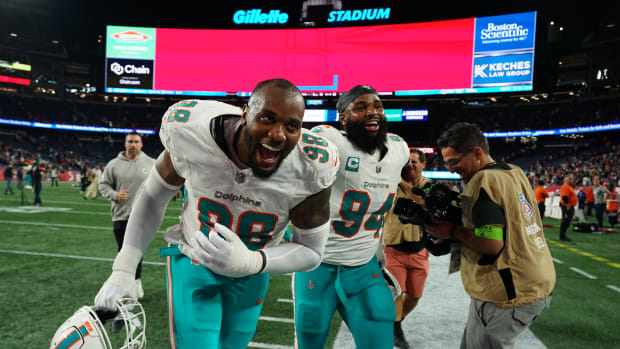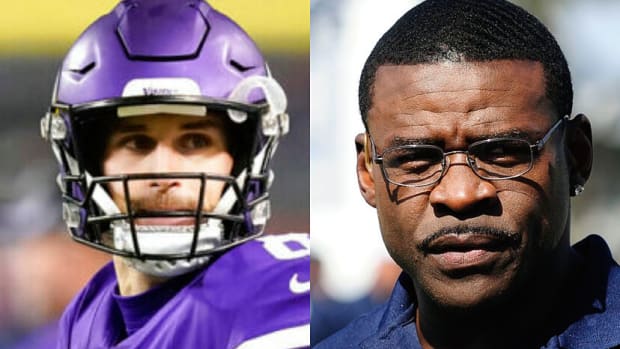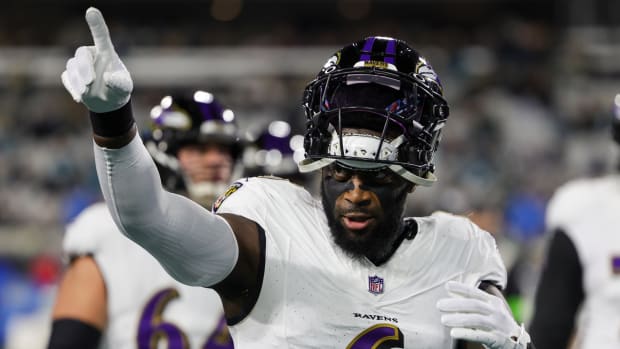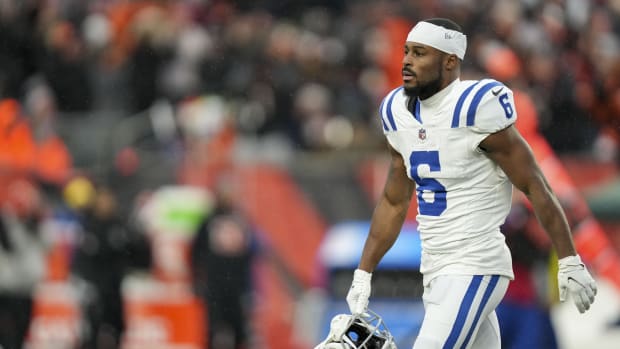Can Kyler Murray Make It in the NFL? Lincoln Riley’s Short Answer: Absolutely
Kliff Kingsbury and Lincoln Riley were in the same quarterback room as Texas Tech players in 2002. They’ve coached against each other over the last four years. Their offenses both find grounding in what they learned from their old coach, Mike Leach.
Kingsbury, the new coach of the Arizona Cardinals, has the first overall pick in the 2019 draft. Riley, the coach of the Oklahoma Sooners, has a quarterback he thinks is worthy of it.
And much of the conversation about that quarterback, Oklahoma dynamo Kyler Murray, and where he’ll go in the draft—in the 10 days since Murray made the call to focus on being a pro football player, over a certain fortune in baseball—has centered on which teams and schemes might fit a 5'10" (-ish) quarterback.
It stands to reason that few people would be better positioned to know how the Heisman winner might work in a Kingsbury offense in Arizona than Riley. So I asked him the other day how he saw it, and he has little doubt: If the Cardinals would even entertain the thought, fit wouldn’t be a problem.
“Oh, absolutely,” Riley said. “There is absolutely zero question about that. I know there are a lot of other steps [in Arizona]—obviously, a lot of things would have to happen for that to happen. But I don’t think there’s any doubt. And part of that is I think Kyler is going to be a fit for anybody. Of course there are teams I’d rather see him with than not and coordinators I’d rather see him with than not, just personally.
“But there’s not any situation where I’d really fear for him. I think he’s going to go in and do well. Would he do a great job with what Kliff’s going to do offensively? I don’t think there’s any question.”
Kingsbury has been adamant over the last week that the Cardinals are sticking with Josh Rosen, the quarterback they traded up to draft last April with the 10th overall pick. We don’t have any reason not to believe him, for now. Maybe that changes. Maybe it doesn’t.
But the really crazy part is that we’re having this discussion in the first place. And believe me on this—Riley is a big part of the reason why.
In this week’s Game Plan, I’ll get to your questions on the draft’s defensive line class, whether or not Dallas would pursue Antonio Brown, the NFL’s decision to disinvite players to the combine (and now re-invite them just for medicals), what players might ask for in the next CBA, and how Greg Schiano might make his presence felt in Foxboro.
But we’re starting with something I wrote last June, something anyone who’s a regular here knows I’ve back-referenced a lot. The NFL is fascinated with Lincoln Riley. I have less doubt than Riley has on Murray that the OU boss would be a head coach in the league today if he’d declared in January that he wanted to be—and that NFL coaches will flock to Norman this spring to learn from him, just as they did last spring.
Eight months ago he and I discussed all that, and what he’s observed at the NFL level, which is an explosion of college concepts cribbed and fit to the pro game by forward-thinking coaches. As Riley sees it, based on NFL tape he studied in the downtime between the Sooners’ regular season and the Orange Bowl, and what he saw during the playoffs in January, that’s only increased in the time since.
“It’s growing exponentially each year,” he said. “You see the similarities between the college game and the pro game. It’s just becoming closer and closer, there’s more and more each year. And I think it’s evident, again, by the teams that were in there at the end. All those teams in there at the end, the top six or seven NFL teams, are doing things similar to some of these offenses you’re seeing in college.
“I think four of those six or seven were the final four teams in the NFL playoffs. It’s fun to see, it’s exciting to see, and I think it’s going to continue to grow.”
The reasons aren’t hard to figure. I brought up the open-mindedness of NFL coaches, versus the way the league used to be, and he agreed that that’s helped push change. I raised the speed with which coaches can get tape on other teams at whatever level, and he said that’s a factor too.
And while attributing the movement to a broader set of components—he referenced the NFL’s final four (the Patriots, Chiefs, Rams and Saints) repeatedly as leaders in this area—Riley highlighted a couple things that NFL teams can’t control.
“Another big underrated thing is the new hours rules, with the bargaining agreement, the more limited time that these NFL coaches have now with their players, both on the field and in the meeting room,” Riley said. “It’s not exact, but it’s much closer to the college model now, where you’ve only got so much time.
“And at the end of the day, if you’re gonna pay some cat millions of dollars, are you gonna be patient enough, if you’re not gonna do anything like he did in his college system, and his college system is so radically different from anything that you want to do? If you make everyone conform to your system, are you gonna be patient enough to sit there, pay him all this money and have him not ready to produce?”
The fact that these sorts of adaptions are working, of course, doesn’t hurt either. And here’s the thing—if you’ve got coaches willing to buck long-held conventional wisdom in one area, and crush it as a result, it stands to reason that those same coaches might be willing to challenge the way things have been done in another area too.
Which is where the 5'10" (-ish) quarterback comes in.
In 2017, Riley had the Heisman winner. In 2018, Riley had the Heisman winner. In 2017, at this point, no one had Baker Mayfield going first overall. In 2018, it seems a lot less impossible that an undersized quarterback would go that high.
That brings us back to that thing the NFL doesn’t control—the kind of football that is successful in its de facto minor league. And Baker Mayfield and Kyler Murray can offer as good a window into that notion as any scheme can. Mayfield beat out 6'5" Davis Webb playing for Kingsbury at Tech, then won the OU job as a walk-on over 6'5" four-star recruit Cody Thomas—who, interestingly enough, is now playing baseball in the Dodgers’ organization.
The 6-foot Mayfield was then succeeded by an even shorter quarterback—Murray. What’s more, Riley says now he barely changed the offense at all in the transition.
“A few things, but I’d say 90 to 95 percent of it, it wouldn’t have mattered to me which of those guys was in there,” Riley said. “There are actually a lot of similarities between those two, as far as how they processed, how they saw the game, making in-game adjustments, accuracy, decision-making. A lot of that was done at a very high level with both of those guys.”
What’s inarguable, in looking at all this, is that size isn’t the factor it was 10 or 15 years ago in how the NFL grades quarterbacks.
But that doesn’t mean it’s a non-factor. A few scouts said to me last week that if Murray were 6'5" and 225 pounds he’d be a slam dunk as the first pick in the draft—whether it was Arizona taking him or someone coming up to get him. When I asked Riley if he thought we’d even be discussing who the first pick would be if that were the case, he concurred, which is a tacit admission that size does, in fact, still matter.
“Uh, no. No,” Riley said. “Maybe we shouldn’t be having that conversation anyway. … I think it’s a factor. But I don’t think it’s as big a factor as it’s been before. I think people have started to see past that. No, we probably wouldn’t be having that conversation. But where 10 or 15 years ago, maybe he’s drafted in the second or third round or whatever, now, I’m gonna be shocked if he gets out of the top five.”
The good news? That sort of progress has opened the NFL door for a quarterback the likes of which Riley told me he’s never seen before. Twenty years ago Murray might’ve come out of high school with that absurd highlight tape of his and changed positions—with some coach seeing a generational athlete, thinking he’s not big enough to be a QB, and wanting to get him on the field.
That it hasn’t happened yet, and no one is discussing it now, feels like a step forward in how football people think. That it almost certainly won’t happen, period, is pretty damn exciting, when you listen to Murray’s coach break down his assets.
“The athleticism, the combination of the speed, the quickness, the feel for the game, and then also having a very accurate and twitchy arm—I mean, it’s a rare skill set,” Riley said. “I don’t know that I’ve watched anybody play the game that has a skill set like this guy. I don’t think there’s ever been one. I think it’s that unique. Just that whole combination, it’s really something special. I haven’t had anyone even close to him, honestly.
“It’s been fun to watch, and I think his best ball is certainly ahead of him.”
A generation ago we probably wouldn’t have even gotten to find out. He probably would’ve been Charlie Ward heading off to the NBA, never to buckle a chinstrap again.
So a lot of Murray’s situation is going to come down to which teams are comfortable with his size and are willing to build around a 5'10"(-ish) quarterback, who is also facing legitimate questions about his ability to carry weight on his small (-ish) frame.
I can’t tell you which exactly which teams are or aren’t in the Murray discussion right now. If you’re listening to Riley, it’s easy to conclude that Kingsbury wasn’t just Lou Holtz-ing it in October, and that he’d be on the list. And based on what we know about the NFL, and how people like Riley have impacted it, it’s also fair to conclude that list is a lot longer than it would’ve been even a decade ago.
“There were probably some of the same questions when Michael Vick came out— ‘Here’s this dynamic athlete, how will he fit in the NFL?’ ” Riley said. “And I think there are some strong similarities between Kyler’s and his game, and there are some big differences too. It’s a similar enough situation where that’s a good comparison. With him being 5’10”, would he have been as high a pick?
“I’ll say this—I don’t know if he’d have been such a viable option for so many different teams as he is right now. I think he’s a dynamic enough player, that I think even 10 or 15 years ago, he would have had great opportunities, but I don’t know that he’d have as many as he’s getting ready to have now.”
And that’s pretty cool to see.
On to your questions …
MAIL TIME!
From Don Ridenour (@DonRidenour): How many D-tackles and D-linemen go in the top 10 this year?
I’d consider Nick Bosa and Quinnen Williams locks. Josh Allen will go in the top 10 too, but I’d say he’s more of a hybrid than some seem to think—he’s like Tremaine Edmunds was last year, capable of playing up or down. Also in the top 10 mix: Clemson’s Dexter Lawrence, Christian Wilkins and Clelin Ferrell, Michigan’s Rashan Gary, Mississippi State’s Montez Sweat and Houston’s Ed Oliver. And Mississippi State’s Jeffrey Simmons would be in there too had he not torn his ACL.
Count ’em up. I gave you 10 names. A clean sweep isn’t happening of course, and the inevitable rise of quarterbacks could keep the number down. But this is a very, very strong class of defensive linemen, with upwards of 20 in the running to go in the first round, which would be a bonkers number for any position.
From David Jaulus (@djgiantsfan): Could you see Antonio Brown ending up in Dallas?
This makes zero—Z-E-R-O—sense for a couple different reasons. First, the Cowboys already have a receiver on their roster, in Amari Cooper, whom they have to pay, with the market at that position having escalated significantly over the last 12 months. Brown wants a revision to his deal. And Cooper needs to get paid too.
Then there’s global challenge that Dallas faces a result of the success it’s had building its team. Demarcus Lawrence is up again and will be tagged north of $20 million, which means he’ll want a long-term deal averaging at least that much. Dak Prescott, Jaylon Smith and Byron Jones are in contract years. And Zeke Elliott is going to make noise about getting a big second deal. It’s a lot of mouths to feed.
Then, there’s the matter of Prescott, and his development, and the affect that any struggles the offense has might have on Brown. And finally, Dallas doesn’t have its first-round pick—dealt away to Oakland for Cooper. So yeah, you’re probably better off forgetting about it. I think Earl Thomas is unlikely unless Thomas is willing to take less to come home. I think Brown is borderline impossible.
From foot ball guy (@Foot_Ball_Guy69): Which new coach’s staff is most impressive thus far?
Of the eight, I’d say I like Miami and Tampa the most, for a very simple reason—they’re built with like-minded people. Bruce Arians’ coordinators (Byron Leftwich, Harold Goodwin, Todd Bowles and Amon Jones) all worked for him in Arizona and are longtime confidants of his. So there’s no feeling-out process necessary there amongst the coaching staff.
And while Brian Flores’ staff in Miami isn’t quite like that, there are a ton of Patriot fingerprints on his group. OC Chad O’Shea was with Flores for a decade in Foxboro. Assistant quarterbacks coach Jerry Schuplinski and defensive pass-game coordinator Josh Boyer came with him from New England too. DC Patrick Graham spent seven years under Belichick, and with Flores, there. Even special teams coach Danny Crossman came up under a dyed-in-the-wool Belichick guy, Scotty O’Brien.
Obviously having that kind of alignment doesn’t guarantee anything. But I don’t think it hurts.
From Jason (@Flubbedtundra03): Do you think the NFLPA and the players are pushing towards a CBA much like the NBA, with huge guaranteed money? I can see teams that do pay huge amounts end up sucking because they wont be able to afford other top end talent.
Jason, thanks for the opportunity to knock down a myth—NBA players don’t have guaranteed contracts written into their CBA. No major professional sports league in North America does, nor do any of those CBAs prohibit fully guaranteed contracts. Things are the way they are because of precedent, and where negotiations between players, agents and teams have steered it.
That’s why Kirk Cousins’ deal was so significant. Because that’s how it has to start— with a single player putting his neck on the line, and creating precedent. Whether or not players and agents can get much past that remains to be seen. Part of the issue for pro football players, by the way, has been that there are too many of them in general, and too many specifically that are interchangeable with one another.
From Andrew Fisher (@ColtsFisher): Will the new CBA address the discrepancy between the rookie and veteran salaries, especially at QB? Seems like teams would be better off trading away average franchise QBs after multiple seasons below .500 in an attempt to find an equally talented player for less $$$ (e.g., DET).
It’s funny, because back in 2010 bloated rookie salaries were universally seen as a bad thing. But the truth was, they really weren’t bad for veteran players—in plenty of cases the structure of rookie contracts pushed franchise-tag numbers higher and set floors for megadeals done for the older guys. Unfortunately, too many of us allowed bewilderment over guys like JaMarcus Russell getting rich to cloud our reason.
We’re obvious not going back there in 2021. But I do think a fair thing for players to ask for is shorter rookie deals. Football is not basketball or baseball. These guys aren’t coming into the league as teenagers, and their lifespan as athletes isn’t as long. So if I’m the union, I fight for unrestricted free agency after three years, maybe with only first-round picks signing for four years out of college.
This is also where I think the 18-game season could come into play. Think about it. If they’re asking a third-round pick to play 18 games, that means he has to get through 72 games, instead of 64 to make it to free agency, adding a half-season of injury risk to the equation. So why not let him be free after three years (54 games) as the compromise?
From Chi Cheong Ho (@chicheongho): Revoking invitations to combine: one-time blip or trend?
I’ve said it before. I’ll say it again. Banning guys like Simmons and Louisiana Tech’s Jaylon Ferguson is asinine, and underscores the larger fight going on over the combine as an entity—the league views it as an entertainment vehicle, while the teams are battling to maintain its functionality.
Make no mistake, this is not about an invite to the combine being a privilege and not a right. This is about the NFL not wanting its TV show to have to tackle sensitive topics.
I’m with the teams here, in case you couldn’t tell. The combine is for them to get baseline tests for these players on a lot of different levels—medical, athletic, mental and personal among them. And there’s no one they need to see more in that sort of setting than the guys who have skeletons in their closets. In fact, I’d argue that the league is doing those players a favor by letting them skip the grilling they’d get in Indy.
From Nick Koss (@kosstheboss34): @ProFootballTalk proposed waiving the waiting period for the HOF for Brady and Belichick. Agree or disagree?
Nick, I’m not against doing anything to honor the greatness of those two, because what they’ve accomplished will never be duplicated. So yeah, I’m good with Florio’s idea.
I also don’t think we should even be comparing them to football figures anymore. To me, it’s time to weigh where Belichick is against the Red Auerbachs, Scotty Bowmans and John Woodens of the world, and how Brady stacks up against athletes like Michael Jordan, Jack Nicklaus, Wayne Gretzky and Babe Ruth.
From Fernando Macedo (@fmacedocosta30): How do you see Greg Schiano’s infuence on Belichick defense?
Hey Fernando, I watched a lot of Schiano’s defense last year. And Ohio State was as bad on defense as it’s been since I got to school there 20 years ago. That said, in Schiano’s first two years in Columbus, OSU was good, for the most part, on D.
It’s hard to say how much power he’ll have to change what Belichick does on defense. But I can tell you what he was in Columbus, which was aggressive. They pressured a ton and didn’t have any problem putting their coverage guys on island, which was, in part, about having better players than just about anyone else (and which came back to bite Schiano in 2018).
Remember, Brian Flores was really aggressive too coming in, and that worked out. So we’ll see where this one goes.
Question or comment? Email us at talkback@themmqb.com.




































